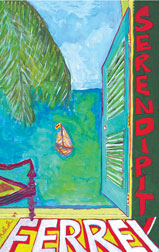Serendipity from a different world
By Ranga CHANDRARATHNE
Ashok Ferrey's maiden novel `Serendipity' is written in a bizarre
narrative style which the author describes as a non-linear narrative.
The plot lased with satire shifts from London to Sri Lanka touching on
the lives of Sri Lankan diaspora, at times ridiculing the system of
International Schools in Colombo. Amidst parties, chaotic relationship
between Piyumi and Marek, election campaign commences. The story
principally meanders through upper middle class circles and social life.
However, the novel is without mistakes in grammar but blemished syntax.
The author has apparently not paid any attention to literary theory or
portraying characters. One of the chief weaknesses of `Serendipity' is
that lack of description and over reliance on dialogues.

 |
|
Author Ashok Ferrey |
It seems that the novel is a kind of an unfathomable riddle for
readers. In terms of literary theory and depiction of characters, the
book scrawls and stands nowhere. For instance, the language is not
impressive and the author has not been able to come out of his rather
monotonous style of writing.
However, it is an important book in terms of studying the standards
of Sri Lankan writings in English. The author's purpose of writing the
book is unclear since none of the characters has been evolved to a
logical conclusion and the story leads to nowhere. However, the book is
a story from a different world. Though the book is readable, the author
has failed to maintain the contextual clarity.
One of the significant aspects of Ashok Ferrey's writing is that he
has an innate ability to create humour out of commonplace situations.
This is amply present in the book. For instance, the entire issue of
dividing the Serendipity, ancestral home of Piyumi has been turned into
a series of humorous incidents. The motive behind Marek's voluntary
painting of the walls of the Serendipity is turned out to be only to
have sex with Piyumi.
In this genre, Ashok Ferrey is, perhaps, the best Sri Lankan writer
in English. His ability to create humorous situations is peerless. He is
also the pioneer in this tradition in contemporary Sri Lankan fiction in
English.
Ashok Ferrey, the author of two Gratiaen shortlisted books, `Colpetty
People' and `The Good Little Ceylonese Girl', has just released this
long-awaited debut novel called `Serendipity'. Here are excerpts of an
interview with the author:
Q: Your new book came out on December 5. It went into a second print
before Christmas. Is this a record by Sri Lankan standards particularly
for English fiction by Sri Lankan authors in English?
A: It's been three years since I last brought out a book. As a
writer, you're always nervous when you put out something new. People's
expectations are that much higher. Will it be good? Will it be rubbish?
Will people use it to wrap up the dog meat? I hope at least they have
the decency to read it before it gets to the dog.
Q: Do you consider this book a radical departure from your previous
ones?
A: Yes and no. I don't think a writer is able to change his style
that much even if he wants to. In my case, the so-called wit is the
heavy cross I've always had to bear. People naturally think that if
you're humorous you must be an idiot. I'm dealing with a much more
serious theme here . . . at one time I even considered writing under a
different name" keeping one step ahead of the reading public! But you
know, this is Sri Lanka, they would have found me out - you don't fool
people that easily. This book is a departure in that I'm dealing with a
problem for which there are no clear-cut answers. Many people think they
have the answers. I'm sad to say I'm not one of them.
Q: Are you really dealing with it serious issues in the novel? You
seem like a dog sniffing a bone, circling round it, never actually
biting it!
A: Oh, there's that dog again! I guess this is my way of dealing with
it. We in Sri Lanka are such a disparate (and desperate) bunch of
people" so many different races, religions, classes, all packed tightly
together, all living in and out of each others' pockets.
There's no way we would all have the same opinion on any issue, let
alone big, serious issues. People talk of Europe or America being full
of different nationalities and opinions, but actually, European or
American views are very much more homogeneous than ours here. It's a
huge weakness in this society here" it's what makes us such an
ungovernable, quarrelsome lot! In the book I express many different
points of view and leave you to make your choice. It's a sort of mirror.
You will see in it what you want to.
Q: I would say that one of the weaknesses of this book is that none
of your characters is very likeable. You can't really empathize with any
of them. There's no clear protagonist, no hero!
A: If your best friend commits murder you will naturally think he's
been framed. If your worst enemy builds a cancer hospital you will
naturally think he's doing it for personal gain and glory.
In other words, your individual assumptions about other people are
only a reflection of your particular take on life. How accurate is this?
It seems to me we spend our lives desperately seeking heroes. We find
them in politicians. We find them in golfers called Tiger Woods. Then
we're crushed to discover they're not the paragons we thought they were.
In my book there are no heroes. The characters all have fatal flaws.
Sadly, that makes them very un-loveable.
Q: Is this your particular take on life?
A: Yes. Probably go to prove what a miserable old cuss I am
underneath all this supposed wit and humour! One day I've promised
myself I'll write a book where the goodies are all noble and poor but
thoroughly good and the baddies all rich and privileged but thoroughly
bad. Then it won't be an Ashok Ferrey book, will it?
Q: In spite of it all, Serendipity is an incredibly funny book!
A: I'm afraid the novel is set deep in Ashok Ferrey territory. Full
of wonderful weirdos. But you know what? We all know people who have
these characteristics "the madness is very real, we all have to live
through it here in Sri Lanka. In fact we're so used to it, we don't
remark on it any more. I challenge anyone to tell me their life is more
`normal' than this, that the events in the book are unrealistic.
Q: Your novel is broken up into many little different bits. It's very
frenzied, there's too much going on. Is there a reason for this?
A: I suppose I could easily have written a linear novel, events going
from A to B, moving inexorably towards an inevitable conclusion. What
you have instead is a mosaic of shimmering glittery bits, which may not
mean much when you're up close reading the book, but will hopefully mean
something when you put it down and step back.
Don't forget the title, serendipity. The events in the book have
certain randomness to them. For me life has always had this zigzag,
haphazard quality. Somewhere in the book I've called it "the fish in the
tsunami, floating free, skimming waves, flying from crest to crest in a
streak of diagonal silver."
Q: You also have bombs, elections, even an election candidate called
Fonseca. Is this premeditated?
A: Ha! The book was written well over a year ago. In Sri Lanka when
you write you always have a problem with names, the moment you choose a
name everyone naturally thinks you are writing about them.
I searched high and low for names that were neutral enough, ones that
had no associations with anyone known. I chose the innocuous, then
unknown, name of Fonseca. Boy oh boy!
Q: You're known for reading dramatized humorous passages from your
books. Will you be doing the same this time?
A: I love reading out loud. It seems to me the entire character of
the words, their precise shapes and meanings change subtly depending on
how you read them.
Almost the whole of this book was written as a performance piece!
I'll be reading from it for the first time at the Hi book club on
Wednesday, January 20, and then at the GLF on Friday, January 29 at
Closenberg Hotel.
Q: Finally, how has the book been received?
A: You'll have to go to the kennels to find out. So far all I've
heard is woof!
|

